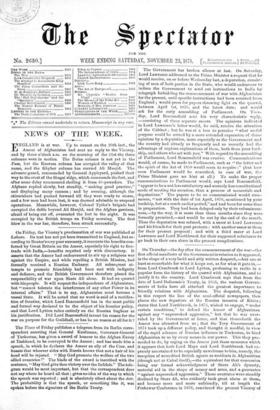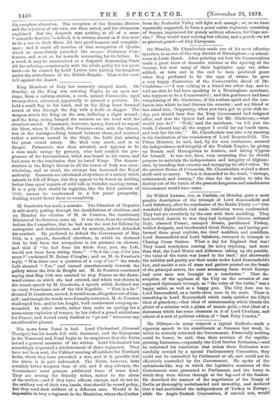On Thursday—the day after the commencement of the war—the first
official manifesto of the Government in relation to it appeared, in the shape of a very lucid and ably written despatch,—but one at least as remarkable for what it keeps out, as for what it puts in,— from Lord Cranbrook to Lord Lytton, professing to recite in a popular form the history of the quarrel with Afghaniitan, and to justify it to the country. Lord Cranbrook says that from the date of Lord Dalhousie's Treaty, in 1835, the various Govern- ments of India have all attached the greatest importance to friendly relations with Afghanistan. The despatch, following in this respect the line of the semi-official newspapers, then places the new departure at the Russian invasion of Khiva ; states that Lord Northbrook, in 1873, wished to engage, " under certain conditions," to defend the Ameer of Afghanistan against any " unprovoked aggression," but that he was over- ruled by the Government at home, and that thenceforth the Ameer was alienated from us ; that the Tory Government of 1874 took up a different policy, and thought it needful, in view of the rapid advance of Russian influence in Turkestan, to bind Afghanistan to us by every means in our power. This they pro- ceeded to do, by urging on the Ameer just those measures which it appears that both Lord Mayo and Lord Northbrook had ex- pressly ascertained to'be especially unwelcome to him, namely, the reception of accredited British agents as residents in Afghanistan (though not at Cabal itself),—the equivalent for that concession being our formal acknowledgment of Shere Ali's dynasty, material aid in the shape of money and arms, and a guarantee "against unprovoked aggression." These overtures were steadily declined by Shere Ali, who evidently took great alarm at them, and became more and more unfriendly, till at length the Peshawar Conference in 1876, convinced the present Viceroy of
his complete alienation. The reception of the Russian Mission and the rejection of our own, are then noted, and the ultimatum explained. But the despatch says nothing at all of a more " scientific frontier,"—indeed, it is written almost as if this were to be a war to drub Shere All into good-humour and complais- ance; and it omits all mention of that occupation of Quetta which so immediately preceded the manqué Peshawar Con- ference, and went so far towards accounting for its failure. In a word, it may be summarised as a despatch denouncing Shere Ali for refusing—consistently with his whole policy for ten years back—to be coaxed by Lord Lytton into putting his kingdom under the surveillance of the British Empire. That is the cusus UM against the Ameer.



































